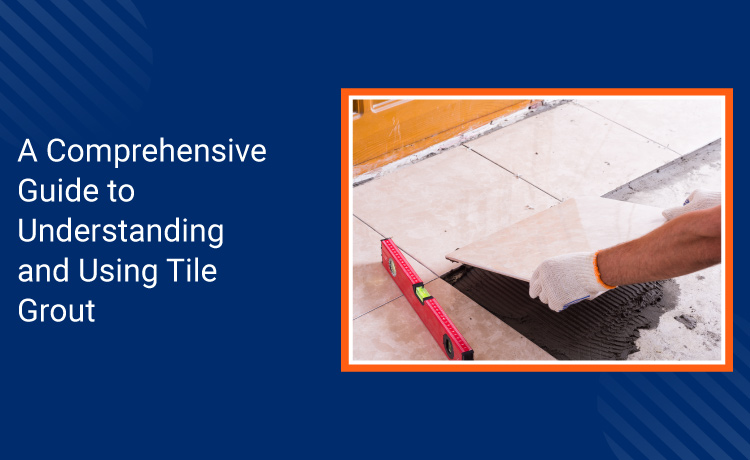 February 10, 2025
February 10, 2025
Whether it is the industrial area or residential property, tile grouts are used everywhere to install and fix a variety of tiles. Its fluidity and plasticity reinforce tile installation and prevent underlayments from water infiltration. If you are planning for tile installation, knowing its types, benefits, and how to choose the right tile grout for your requirements is highly essential. This comprehensive blog unravels everything you should know about tile grout, along with its basic introduction, types, benefits, and how to choose them correctly.
Grout is a dense fluid mixture of cement, aggregate, sand, and water. It is used to seal cracks and reinforce the existing structure. The thickness of the grout lies between mortar and concrete. Grout has fluidity and plasticity properties, making it suitable for filling gaps and sealing joints. It offers a long life span and high permeability to various applications, including tiling and filling constructional voids.
Cement-based tile grouts are composed of high-strength cement, selected silicon/quartz mineral charges, and specific additives. They are used to fix ceramic tiles and offer optimal ergonomics aligned with the floor dimensions. They offer an array of benefits, including easy-to-use, excellent waterproofing characteristics, and slip-resistant properties.
Epoxy grout is one of the strongest grouts used for joining and fixing tiles on high-traffic floors. It is also widely used in malls, restaurants, hospitals, and public places to handle high traffic without crumbling or cracking. Its non-porous properties restrict water infiltration and prolong the tile’s lifespan.
Furan resin grout exhibits similar properties to epoxy grout. It is composed of furfuryl alcohol polymers, offering excellent chemical resistance properties. It provides excellent strength and durability and has excellent temperature tolerance ability (up to 450°F). It is suitable for industrial use due to its excellent chemical resistance properties, high strength, and durability.
Pre-mixed polymer grout is ready-to-use professionally mixed grout renowned for offering excellent colour consistency and high stain resistance properties. It is tough, durable, crack resistant, and inhibits mildew growth in the tile joints. Pre-mixed grout doesn’t require any sealing agents, offering hassle-free application and cleaning. It is extensively used in interior floors and walls, bathrooms, kitchens, and grout restoration.
Grout work plays a vital role in preventing moisture damage by sealing tile joints. The high permeability blocks the tile joints from its roots and resists water infiltration. The prevention of water infiltration protects the surface from being damp and thus prevents potential damage from moisture.
Grout fills the gap lines between tiles and creates a clean and polished look. It also draws an even spacing line between tiles, which pops up and gives a professional look to tile joints. Tile grouts have a variety of colour options that can be matched with the tile colour to offer a more aesthetic and polished appeal to the floor.
Proper tiling and grouting fill spaces between tiles and lock them. The locking mechanism and self-healing property allow tiles to stay in their place and eliminate possible movements. Ultimately, these properties of grout aid in providing stability and prolonging the tiles’ life.
Thermal expansion and contraction can break tiles if the tile lines are not filled with grout. Grout handles thermal expansion and contraction effectively and safeguards tiles from cracking. Without tile grout, water can seep into the tile voids and cause damage to underlayment.
Tile types, such as ceramic tiles, porcelain tiles, natural stones, and fully vitrified tiles, are suitable for cement-based grout. In addition, epoxy and furan resin tile grouts are also used in tile adhesive applications. If you are looking for a suitable grout for low-traffic areas, cement-based tile grout would be a suitable choice. Whereas, if you have a high-traffic floor, Epoxy and other high-strength grout would be the best fit. Pre-mixed grout is more suitable for moisture-prone area tiling, and furan resign is suitable for industrial use.
Choosing tile grouts based on the location is vital to harness the grout properties more efficiently. Various grouts are designed to work better in specific locations. If you want to install tiles in moisture-prone areas, epoxy and pre-mixed grouts would be the best fit. Whereas, cement-based grouts are highly suitable for living rooms, dining rooms, and balconies.
Choosing a tile grout that matches your tile contrast is equally important. It complements the tile colour and provides it with a professional look. Most tile grouts come with various colour choices, allowing customers to choose from based on their tile colour preferences.
Some of the tile grouts require a sealant to fix the tiles and maintain their appearance. Choosing those grout that don’t require sealant would be a wise choice. It minimises maintenance costs and reduces heavy contamination buildups. However, regular cleaning is still required.
If you are facing difficulties in choosing the right tile grout for your needs, it is recommended to consult a professional and let them your requirements. They are trained to suggest a suitable grout based on your requirements, location, and tile type.
Tile grout is a must-have material for tile installation. It offers stability, safeguards underlayment from water seepage, and restricts mildew build-ups. However, choosing the right tile grout is crucial for better and longer-lasting results.
MCon Rasayan is a leading and renowned construction chemicals manufacturer in India. We have a range of tile grouts suitable for every tile type and location. Contact us today to get our highly efficient tile grouts with excellent waterproofing characteristics.